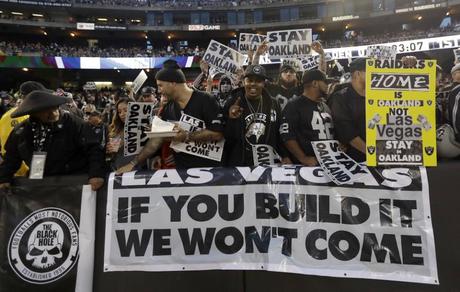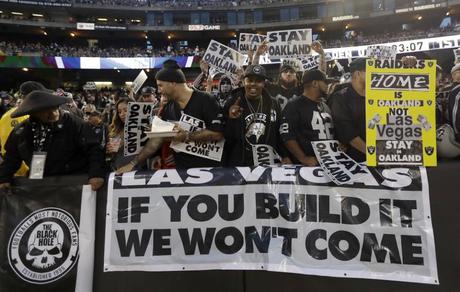Photo: Scott Strazzante/AP
The exodus of professional sports from Oakland, California is becoming increasingly sad. The Golden State Warriors' move across the Bay Bridge to San Francisco in 2019 was difficult for Oaklanders to swallow. After all, the two cities are not the same. But at least the Warriors stayed close. The NFL's Raiders headed to Las Vegas in 2020, an even rougher departure considering the distance between the bay and the desert. And now Oakland has been dealt a blow, as the last major professional team in the city is heading for the exit: Major League Baseball's Athletics, whose own move to Sin City was completed last week.
Related: Baseball's last dive bar: farewell to the crumbling Oakland Coliseum
The drying out of the professional sports landscape in Oakland is, on some level, the same simple story that is written every time a city loses a team. The Warriors played in an old arena, which left them behind the rest of the NBA in terms of commercial opportunities. The Raiders and A's played in an old stadium, the Oakland Coliseum, which put them at a similar disadvantage against their NFL and MLB peers, respectively. And when the Oakland football and baseball franchises failed to get local governments to give in to their demands for public support to subsidize a sports venue whose benefits would be largely reaped by billionaire club owners, the teams simply folded . Fortunately, the Warriors privately financed their new home. However, Nevada taxpayers are after the Raiders and A's.
Indeed, Oakland is an acute victim of a stadium financing racket that has existed for decades. But the loss of the city's teams isn't just a sign of how wealthy team owners can pit venues against each other. It's also a sporting tragedy because of the storied history of pro sports in Oakland - something the city's departed teams will struggle to replicate as they enter their new era elsewhere.
The Raiders were born in Oakland. And while they attracted a durable, passionate following in Los Angeles in the 1980s and 1990s, Oakland is where the Raiders grew the Raiders. It was in Oakland that the Raiders developed a national reputation for their crazy, costume-clad fans who turned every game into a Halloween party. It was in Oakland that a legendary coach, John Madden, built his career and was on his way to becoming the voice of the sport and the face of the video game. It was in Oakland where the Raiders became a legitimate cultural unifier in a working-class town that the team came to embody. It was also in Oakland where the team won two of three Super Bowls, the other coming in LA in 1983, when then-owner Al Davis had moved his team south while lobbying the Bay Area for stadium improvements. The Raiders returned in 1995 before leaving for good 25 years later.
The story continues
The Athletics, unlike their football contemporaries, did not come from Oakland. But they did build something special there. The franchise began playing ball games in Philadelphia in 1901 and won five World Series there. But by the mid-20th century, in what is now a sad foreshadowing, the financially stingy A's were eclipsed in local popularity by the more expensive Phillies. New ownership took the team to Kansas City in 1955 and then to Oakland in 1968. The club won three World Series in a row starting in 1972 and a fourth in 1989. The A's took numerous forms and had an eclectic revolving door of superstars ranging from stolen base king Rickey Henderson to steroid-addled home run mashers Mark McGwire and José Canseco. In their Moneyball era under general manager Billy Beane, they had a fearsome pitching rotation headlined by Tim Hudson and two crafty lefthanders, Barry Zito and Mark Mulder. When the A's were good, the Coliseum was ugly rocked.


The Warriors have obviously stayed close. But their best days were in Oakland. The rise of the Stephen Curry-led, Steve Kerr-coached dynasty of the 2010s took place at Oracle Arena in Oakland. Draymond Green's technical fouls and elite defense? Never better than in the East Bay. Klay Thompson's endless parade of three-point shots next to Curry? Most productive in Oakland. Kevin Durant's three-year hiatus with the franchise, which included two NBA Finals wins and a third appearance? All in Oakland, just before the franchise moved to its new home in San Francisco.
What will Oakland's Nevadan defectors find in Las Vegas? It will probably vary. Things are already going well for the Raiders, who are selling out every game (as is typical in the NFL) and playing in the kind of shiny new stadium they wanted in Oakland. The Raiders will always be okay because they are an NFL team, and the NFL is a rocket ship that never runs out of fuel. Owner Mark Davis could epically mismanage the franchise - and he probably already has, given the hirings and firings of coaches like Jon Gruden (for racism and homophobia) and Josh McDaniels (for poor coaching) - and the Raiders would can still continue to do that. a thriving company. If things get bad enough on the field, the Raiders will one day get a potentially great quarterback in the draft. The competition is designed to prevent anyone from hitting rock bottom for too long.
The Vegas Golden Knights are another exciting data point for the A's as they prepare for the 2028 season. After joining the NHL as an expansion franchise in 2018, the Golden Knights reached the Stanley Cup Ffnal in their first season. They have built a rabid following and have been competitive almost every year, including earlier this year won the Stanley Cup in their sixth year of existence. Build a good team in Vegas, and they will come - with huge attendance numbers.
That's exactly the point: to become so good so quickly, the local hockey team needed help from the league in which it competed. The NHL's salary cap structure promotes equality between clubs, and Vegas also benefited from an extremely generous expansion structure that allowed them to plunder the rosters of the league's other teams. (The format was so friendly to Vegas that the NHL dialed it back a bit by the time the next expansion team, the Seattle Kraken, joined two seasons ago.)
The A's will get no such help. Baseball has no salary cap or salary floor. Some teams spend money because their owners are making a sincere effort to field contenders, and some teams don't. The athletics very much Do not. Owner John Fisher, the son of the co-founders of clothing store Gap, has always kept athletics at the bottom of the MLB payroll. If the club gets good players, they can enjoy them for a few years until they start to become expensive, at which point Fisher trades them away.
Fisher's lack of apparent care in spending money on a winner has given A's fans little reason to remain emotionally invested in the team. Sometimes the A's still won. Before Fisher bought the club in 2005, the A's were Moneyball's team, outsmarting bigger spenders and competing on a shoestring under general manager Billy Beane. But now every team is analytical and it has become difficult to win economically. The A's were the worst team in baseball last season with a 50-112 record. A's fans have begged him to sell the team, but why should he? Fisher has a valuable financial asset, taxpayer help for a new stadium in Vegas, and no reason to compete for now.
Fisher and MLB Commissioner Rob Manfred were dismissive of the pained fans in Oakland. Fisher reportedly told protesting A fans last week that the team's relocation drama has been "way worse than me for you." When fans protested during a game last season, with numbers at a season high, showing that Oakland still had fans even as Fisher pressured his team, Manfred mocked them. "It's great to see a near-average Major League Baseball crowd at the facility for one night this year," Manfred told a reporter. with dripping condescension in his voice. "That's a great thing." The A's will certainly be bringing fans to the ballpark more often when they open their new stadium in Vegas. But unless the team changes its behavior, one day those fans won't come to games anymore either. The A's say Vegas tourists will fill the stadium, but experts say those predictions appear to be nonsense. Maybe it would help to bring a competing product to the market for a change. Just ask baseball fans about the newest, biggest ghost town in American sports.
